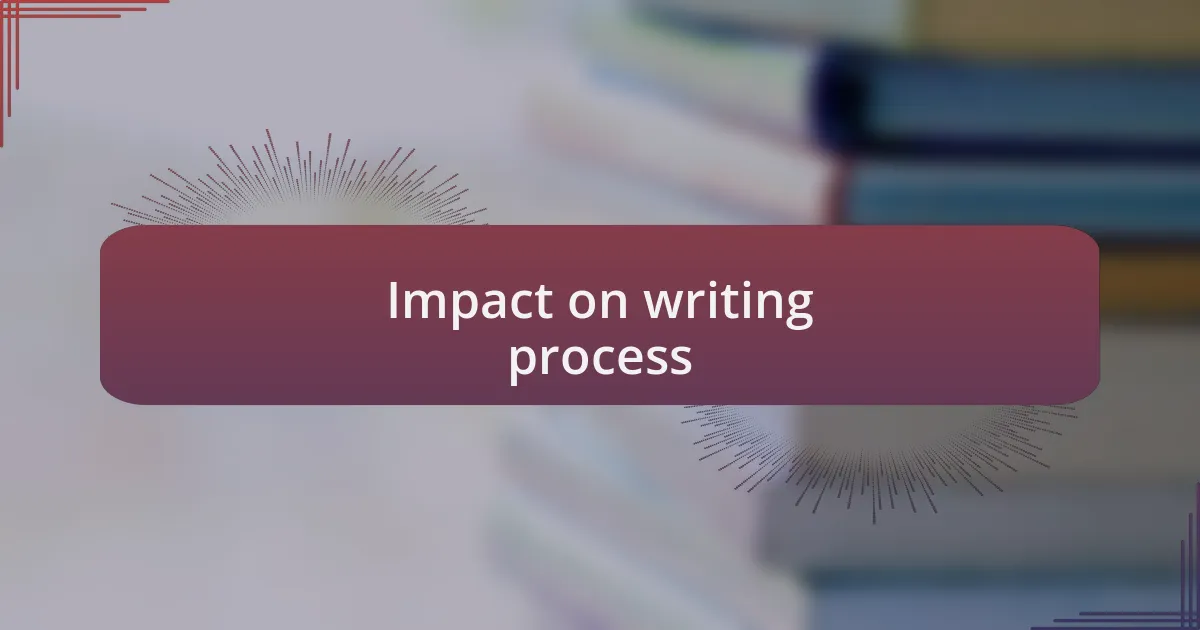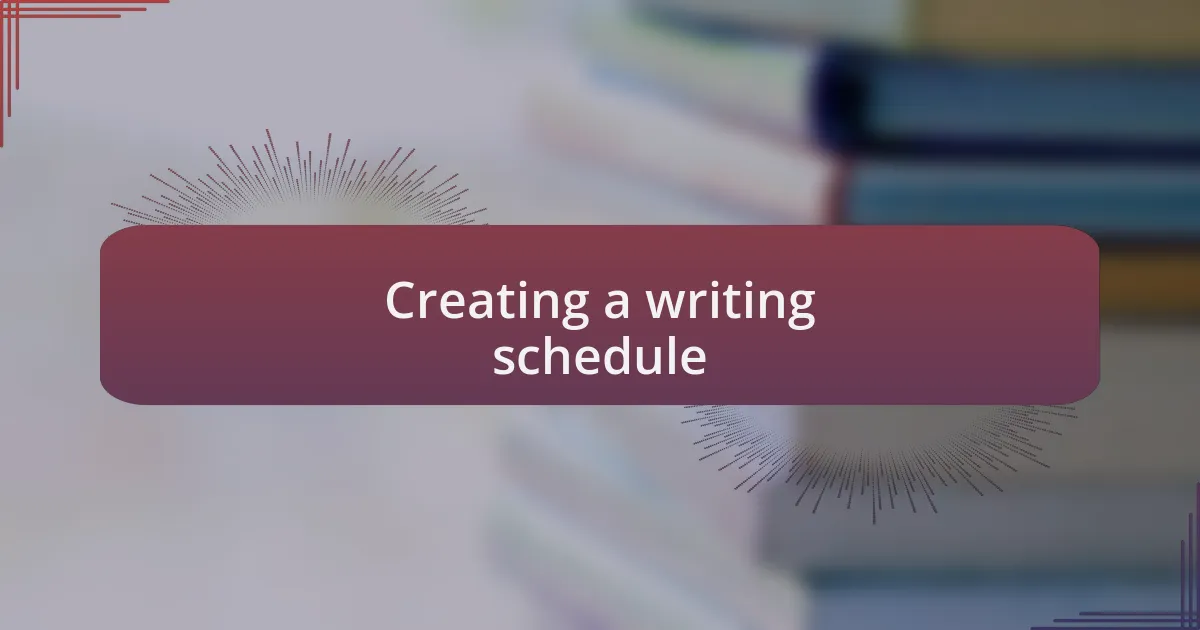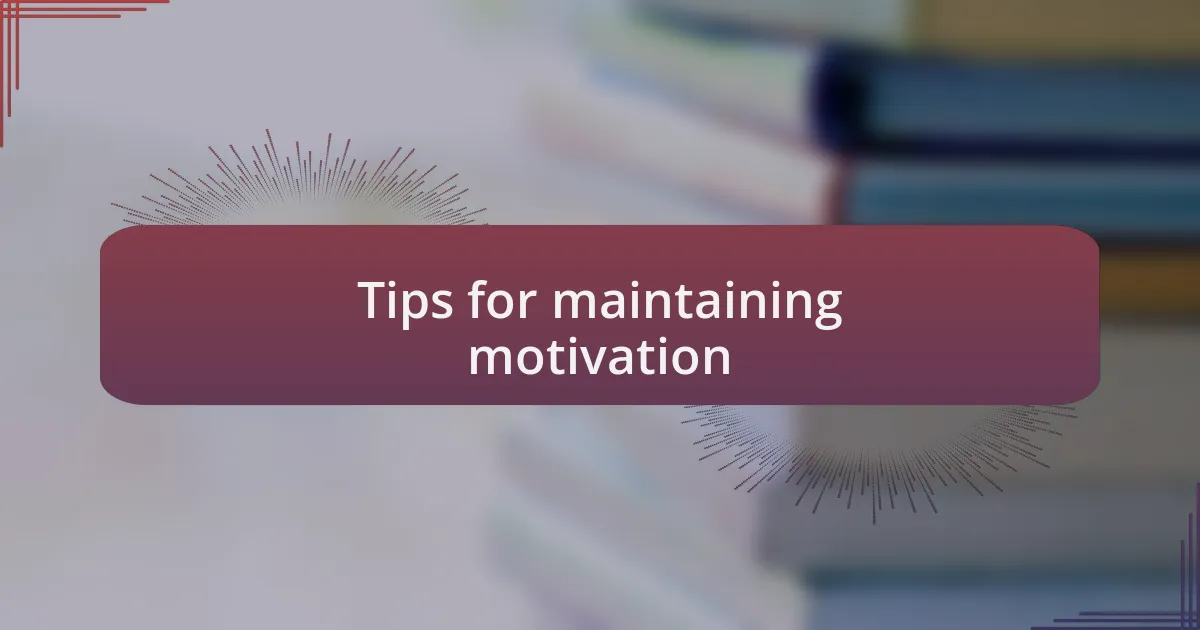Key takeaways:
- Writer’s block is a common experience among writers, marked by self-doubt and high expectations, and can be managed through self-compassion and patience.
- Changing the writing environment and embracing imperfection can rejuvenate creativity and transform setbacks into opportunities for growth.
- Establishing a flexible writing schedule and setting small, achievable goals can enhance consistency and motivation, allowing for a more enjoyable writing journey.
- Finding inspiration through reading, journaling, and connecting with fellow writers fosters creativity and helps alleviate feelings of isolation.
Understanding writer’s block
Writer’s block can feel like an uninvited guest that overstays its welcome. I remember staring at a blank screen for hours, feeling frustration build up inside me. It’s not just a lack of ideas; it’s that heavy cloud of doubt and self-criticism that seems to take over, making you question every word you’ve ever written.
When I first encountered it, I found myself asking, “What’s wrong with me?” This emotional turmoil often stems from high expectations and the fear of failure. I learned that understanding this internal struggle is crucial, as it can help in recognizing that the block is a common experience, shared by many writers, rather than a reflection of my worth.
Navigating through the fog of writer’s block requires patience and compassion for oneself. I once took a day off to stroll through my favorite bookstore, allowing myself to breathe and reset. Sometimes, stepping away from the pressure to create can be the very solution needed to spark inspiration again. Have you ever found that a change of scenery rejuvenates your creativity? I certainly have.

Impact on writing process
Writer’s block profoundly impacts the writing process, often interrupting the flow of creativity and causing a ripple effect on productivity. I recall times when I’d sit at my desk, completely blank, and suddenly I felt like the ideas were miles away, making it seem impossible to get back on track. It’s quite frustrating when a single moment of doubt disrupts the rhythm I’ve cultivated in my writing routine.
When I’m deep in the throes of writer’s block, I notice my writing process becomes disjointed. The words that usually come easily feel cumbersome and forced, which can lead to a harsh inner dialogue that spirals into self-doubt. Reflecting on these moments, I’ve realized they have a unique ability to teach resilience, prompting me to explore different methods and find alternative pathways to express my thoughts.
I often ask myself: how can I shift this energy? Engaging in different activities, such as journaling or free-writing, has been a game-changer for me. These practices remind me that writing doesn’t always have to be perfect; it just needs to be authentic. This shift in mindset not only alleviates the pressure but also rekindles the joy of writing, transforming what initially feels like a setback into an opportunity for growth.
Strategies to overcome writer’s block
One effective strategy I’ve found is setting a timer to write for just five minutes. It seems so simple, but committing to those few minutes can break the overwhelming pressure of producing something perfect. I remember one day feeling completely stuck, so I put on a timer, and before I knew it, I had scribbled down a rough draft that sparked new ideas I hadn’t even considered before.
Another approach that has saved me on countless occasions is changing my environment. Whether it’s moving to a cozy café or just sitting in a different room at home, a fresh setting often brings new inspiration. I once decided to take my notebook outdoors; the sounds and sights of nature not only lifted my mood but also brought a wave of creativity that had been dormant.
Lastly, embracing imperfection can be liberating. I often remind myself that the first draft isn’t meant to be the final copy. During one particularly challenging week, I chose to write without judgment, allowing myself to make mistakes. This liberating mindset shifted my focus from producing a masterpiece to simply enjoying the act of writing, which made all the difference in overcoming that mental block. What strategies have you found helpful?

Creating a writing schedule
Establishing a writing schedule can be transformative. I’ve often found that dedicating specific time slots for writing each day not only builds consistency but also sets my mind into a focused mode. For instance, every morning, I reserve an hour where the world feels quieter, and those minutes turn into my creative zen time. Have you ever noticed how that peace allows ideas to flow more freely?
When I first began implementing a writing schedule, I was skeptical. I remember struggling to carve out time, yet I decided to wake up just thirty minutes earlier. That small change made a huge difference! I could see my progress, and over time, the routine became a natural part of my day. Isn’t it fascinating how a little adjustment can spark a substantial shift?
Flexibility in your schedule is equally important. Life can throw unexpected curveballs, and sticking rigidly to a plan can become more stressful than beneficial. I’ve learned to be gentle with myself, shifting my writing windows as needed rather than forcing my creativity into a box. After all, isn’t the true goal to enjoy the journey of writing rather than adhering to strict rules?

Finding inspiration from books
When I find myself staring at a blank page, I often turn to my bookshelf for inspiration. Recently, I picked up a novel that I had loved years ago, and as I reread it, the author’s vivid descriptions sparked a fire within me. Have you ever revisited a book and felt an old excitement rush back as if the pages were whispering new ideas directly to you?
Sometimes, a single quote from a favorite author can shift my entire mindset. I remember coming across a line that resonated deeply: “You don’t write because you want to say something; you write because you have something to say.” Reflecting on that, I realized the importance of authenticity in my writing journey. Could it be that these words are not just a reminder, but a gentle nudge to dig deeper into my own stories?
Diving into different genres often opens unexpected pathways in my creative process. I’ve noticed that reading poetry can be especially refreshing; the economy of language in those tiny stanzas pushes me to think more critically about my word choices. Have you tried exploring styles that are outside your comfort zone? The thrill of discovering new narratives and textures can be just what you need to break through the barriers of writer’s block.
Personal experiences with writer’s block
Writer’s block has often felt like an ominous cloud blocking my creative sunlight. I recall one particularly challenging week when the words just wouldn’t come. I remember sitting at my desk, feeling a mix of frustration and helplessness as I watched the cursor blink mockingly at me. Have you ever wished for an off-switch for those self-doubts? I realized that stepping away for a short walk helped clear my mind; a simple act transformed my anxiety into clarity.
Then there was a time when I tried free-writing to combat my block. I set a timer for ten minutes and let my thoughts flow without any judgment. It was liberating to write anything that came to mind, even the mundane details of my day. In that messy jumble, I stumbled upon a character I hadn’t considered before, and suddenly, my new story began to form. Doesn’t it feel great when inspiration sneaks up on you when you least expect it?
In another instance, I hit a creative wall while drafting a short story. After days of staring at my screen, I decided to switch gears and focus on something entirely different—an old hobby of sketching. This break not only rejuvenated my spirit but also helped me rediscover the joy of storytelling in a visual format. Have you ever found that taking a step back really gives you a fresh perspective? That moment of tapping into a different creative outlet became a turning point for me, leading to breakthroughs in my writing that I had long been seeking.

Tips for maintaining motivation
To maintain motivation while writing, I find it essential to set small, achievable goals. For example, rather than aiming to complete an entire chapter in one sitting, I focus on writing just one paragraph at a time. This approach not only reduces the pressure but also provides a sense of accomplishment, which can fuel further creativity. Have you ever noticed how a series of small wins can uplift your mood?
Another strategy I’ve discovered is surrounding myself with inspiration. I often create a mood board filled with quotes, images, and even snippets of other works that resonate with my writing style. This visual representation of my aspirations creates a vibrant backdrop that constantly encourages me. Have you ever felt that a physical reminder of your goals can trigger a new wave of energy?
Lastly, I’ve learned the value of connecting with fellow writers. Joining a local writers’ group transformed my writing experience. Sharing ideas and receiving feedback from others not only sparks creativity but also reminds me that I’m not alone in my struggles. Isn’t it reassuring to know that others share similar journeys? Embracing this sense of community has been a game-changer for my motivation.